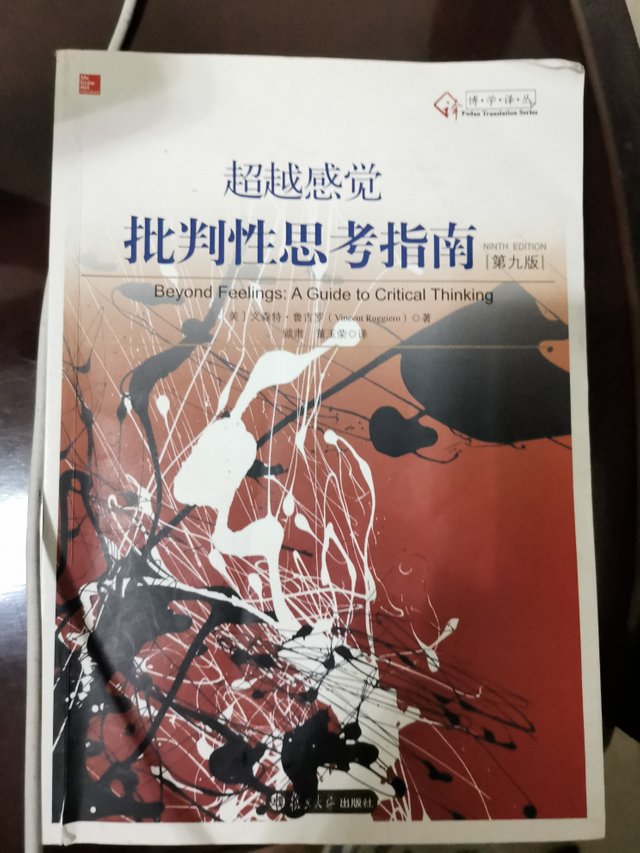《超越感觉》第六章:...

《超越感觉》第六章:你的意见有多好?(73-75页)翻译
个人经验
个人经验是一种不需要去图书馆和互联网的经验。我们的头脑里就有。因此,它往往比其他类型的证据产生更大的影响。我们所遇到的人,我们所处的环境,以及发生在我们身上的事情,似乎比我们所听到或读到的更真实、更有意义。我们对我们的个人经验更加自信。不幸的是,这种信心会使我们认为某些事件的重要性和普遍性超过它们应有的程度。如果我们曾经坐过纽约市的出租车,我们可能会认为我们认识纽约市的出租车司机。如果我们有一个韩国朋友,我们可能会觉得我们认识一般的韩国人,甚至亚洲人。然而,要支持普遍性的结论需要多于一个或者更多的案例;如果要广泛的普遍性,甚至一打案例也不够。
为了评估你自己或他人的个人经验,你要问:事件是典型的还是独特的?他们在数量上足够,并且可以支持结论吗?记住,一件轶事的生动性和戏剧性的程度不能弥补其局限性。
未发表的报告
未发表的报告是我们从别人那里听到的故事,通常被称为流言蜚语或传闻。对于这些报告最大的问题是难以确认真伪。在很多情况下,我们不知道这是二手还是三手、四手甚至五十手的故事。而且故事在人和人之间传递的时候会改变。复述故事的人可能并非不诚实;事实上,他们可能努力做到准确,但不经意间漏掉了一些单词,添加了其他单词,或者更改了事件的细节或顺序。评估一个没有发表的报告,你要问,这个故事的源头在哪里?我如何确认我听到的这个版本是准确的?
已发表的报告
从学术书籍、专业期刊和百科全书文章到杂志或报纸文章、新闻广播以及广播或电视评论,在各种出版或广播作品中都能找到这种证据。在学术著作中,材料的来源通常被仔细地记录在脚注和书目引文中。在非学术性的作品中,记录可能是非正式的、零碎的,或者在某些情况下不存在。即使没有标注引用来源,我们也可以评估作者和出版商的可靠性。事实和观点经常在当代出版物中混在一起,特别是非学术出版物,因此,可能需要仔细阅读,以发现哪些陈述构成证据,哪些陈述需要证据作为依据。
评估公开发表的报告,你要问:报告中所有重要的信息是否都有引用来源?(如果是,你或许希望检查它们)。这个作者是否有仔细做报告的声誉?出版社或者广播者是否以可靠著称?发表的报告中哪些陈述构成了证据,哪些需要证据作为依据?(问这个问题的另一种方式是,一个深思熟虑的人会质疑哪些陈述?作者是否对质疑作出了令人满意的预测和回答?
目击证人的证言
因为目击证人证词通常被认为是最可靠的证据,你可能会惊讶地发现,它有时由于以下几个原因中的任何一个而存在严重的缺陷。外部条件可能不是最理想的——例如,事故可能发生在一个雾天的后半夜,目击证人可能离得很远。目击证人可能很累或者受到酒精或者药物的影响;他或她的观察可能会受到偏见或者预期的扭曲。更进一步的是,人们关于发生了什么事情的记忆可能会被后续的事情混淆。当事件和证词之间经过相当长的时间后,这种混淆可能是一个特殊的问题。
评估目击证人的证言,你要问:事情周边的环境是怎样,包括证人的精神状态,有没有扭曲他或她的感知?(如果有可能发生扭曲,努力判断是否真的发生过)。事情发生后的环境——比如,这个事件的其他方面公开信息可能会影响证人的回忆?
原文:
PERSONAL EXPERIENCE
Personal experience is the one kind of evidence we don’t have to go to the library or the Internet to get. We carry it with us in our minds. For this reason, it tends to exert a greater influence than other kinds of evidence. The individuals we’ve met, the situations we’ve been in, and the things that have happened to us seem more authentic and meaningful than what we have merely heard or read. We are confident about our personal experience. Unfortunately, this confidence can cause us to attach greater significance and universality to particular events than they deserve. If we ride in a New York City taxicab on one occasion, we may think we are acquainted with New York City taxicab drivers. If we have a Korean friend, we may feel that we know Koreans in general or even Asians in general. However, it takes more than one or a few examples to support a generalization; for sweeping generalizations, even a dozen may not be enough.
To evaluate personal experience—your own or other people’s—ask, Are the
events typical or unique? Are they sufficient in number and kind to support the conclusion? Remember that the vividness and dramatic quality of an anecdote cannot compensate for its limitedness.
UNPUBLISHED REPORT
Unpublished reports are stories we hear from other people, often referred to as gossip or hearsay. The biggest problem with such reports is that it is difficult to confirm them. In many cases, we don’t know whether the stories are secondhand or third-, fourth-, or fiftieth hand. And stories have a way of changing as they are passed from person to person. The people who repeat them may not be dishonest; they may, in fact, try to be accurate but then inadvertently leave out some words, add others, or change the details or the order of events.
To evaluate an unpublished report, ask, Where did the story originate?
How can I confirm that the version I heard is accurate?
PUBLISHED REPORT
This kind of evidence is found in a wide variety of published or broadcast works, from scholarly books, professional journals, and encyclopedia articles to magazine or newspaper articles, news broadcasts, and radio or television commentaries. In scholarly works the sources of the material usually are carefully documented in footnotes and bibliographic citations. In nonscholarly works, the documentation may be informal, fragmentary, or, in some cases, nonexistent. Even when the source is not cited, we can assess the author’s and publisher’s reliability. Facts and opinions are often mingled in contemporary publications, particularly nonscholarly ones, so careful reading may be necessary to reveal which statements constitute evidence and which statements should be supported with evidence.
To evaluate a published report, ask, Does the report cite the sources of all important items of information? (If so, you may wish to check them.) Does the author have a reputation for careful reporting? Does the publisher or broadcaster have a reputation for reliability? Which statements in the published report constitute evidence, and which should themselves be supported with evidence? (Another way to ask this question is Which statements might a thoughtful person challenge? Does the author anticipate and answer the challenges satisfactorily?)
EYEWITNESS TESTIMONY
Because eyewitness testimony is commonly considered to be the most reliable kind of evidence, you may be surprised to find that it is sometimes badly flawed for any one of several reasons. The external conditions may not have been optimal—for example, the incident may have occurred late on a foggy night and the eyewitness may have been some distance away. The eyewitness may have been tired or under the influence of alcohol or drugs; his or her observation may also have been distorted by preconceptions or expectations. Further, the person’s memory of what occurred may have been confused by subsequent events. Such confusion can be a special problem when considerable time has elapsed between the event and the testimony.
To evaluate eyewitness testimony, ask, What circumstances surrounding the event, including the eyewitness’s state of mind, could have distorted his or her perception? (If any such distortion was likely, try to determine whether it actually occurred.) What circumstances since the event—for example, the publication of other accounts of the event—could have affected the eyewitness’s recollection?
来自于 [WhereIn Android] (http://www.wherein.io)
吃了吗?你好!家中可愛的寵物照想要跟大家分享嗎?或是出去玩拍到一些可愛的動物,別忘了到@dpet分享,可以得到@dpet的獎勵喔!感谢支持。